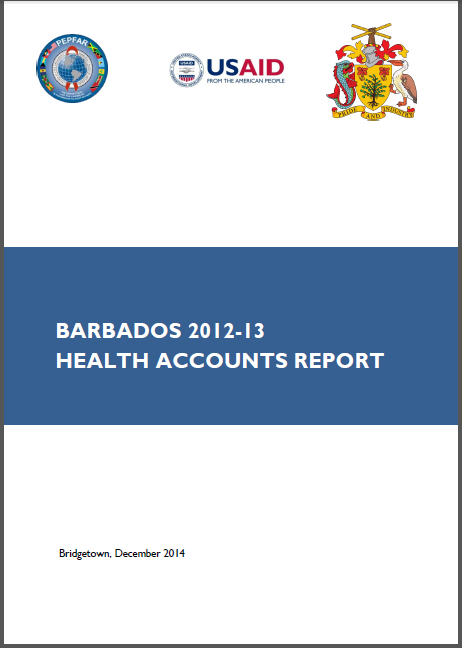Barbados 2012-13 Health Accounts Report
Categories: Home Page Map, Publications, Resource Tracking (NHA, SHA), Where We Work
Resource Type: Report
Authors: Barbados Ministry of Health
Published: December 2014
Resource Description:
 This report presents the findings and policy implications of Barbados’ first Health Accounts estimation, conducted for the year April 2012 to March 2013. It captures spending from all sources: the government, non-governmental organizations, external donors, private employers, private insurance companies and households. The analysis presented breaks down spending to the standard classifications, as defined by the System of Health Accounts 2011 framework, namely sources of financing, financing schemes, type of provider, type of activity and disease/health condition.
This report presents the findings and policy implications of Barbados’ first Health Accounts estimation, conducted for the year April 2012 to March 2013. It captures spending from all sources: the government, non-governmental organizations, external donors, private employers, private insurance companies and households. The analysis presented breaks down spending to the standard classifications, as defined by the System of Health Accounts 2011 framework, namely sources of financing, financing schemes, type of provider, type of activity and disease/health condition.
The rising demand for health care of an ageing population, combined with the rising costs of treating non-communicable diseases and the emergence of new communicable diseases, has driven the Ministry of Health to discuss new health financing reforms. These reforms are being designed to respond to the challenges faced by the health system and aims to put in place mechanisms which will sustain the resources necessary. The reforms will address how resources are mobilized and pooled and what goods and services are purchased. However, no design will respond to the country’s needs if it not based on and informed by sound evidence.
The Health Accounts, building upon the Satellite Account estimation in 2013, provides the Ministry of Health with vital information about health spending. It captures the total amount of spending and presents how this funding flows through the system via different financing mechanisms, providers and activities. This data will help the Ministry of Health to not only decide whether there is sufficient spending for health, but also inform how resources can be reallocated in order to improve efficiency and best meet the health needs of the population. Details of spending provided will inform decisions on how to provide the most appropriate package of services to the population, without risking catastrophic health expenditures. Understanding past HIV spending will also help to inform discussions on HIV resource mobilization and allocation to ensure a financially sustainable response to HIV and AIDS.
Download



